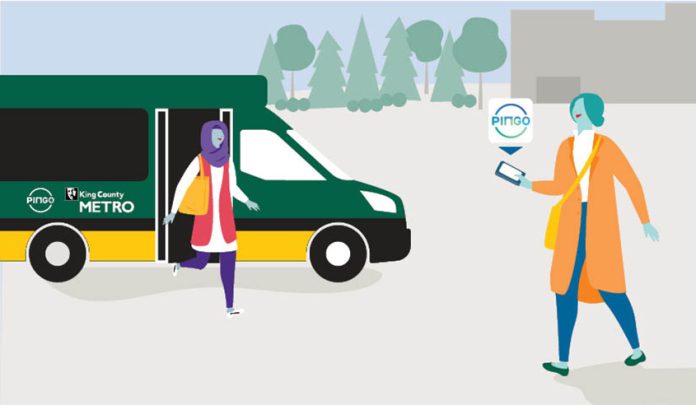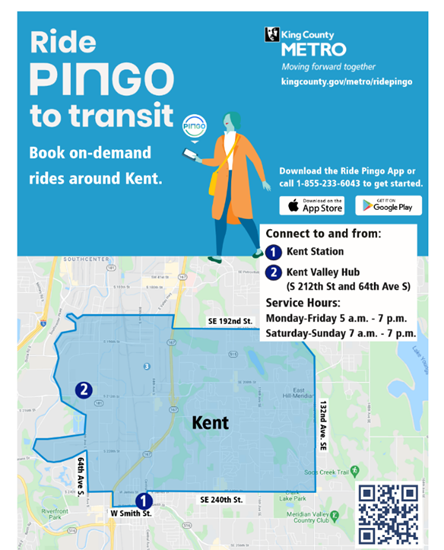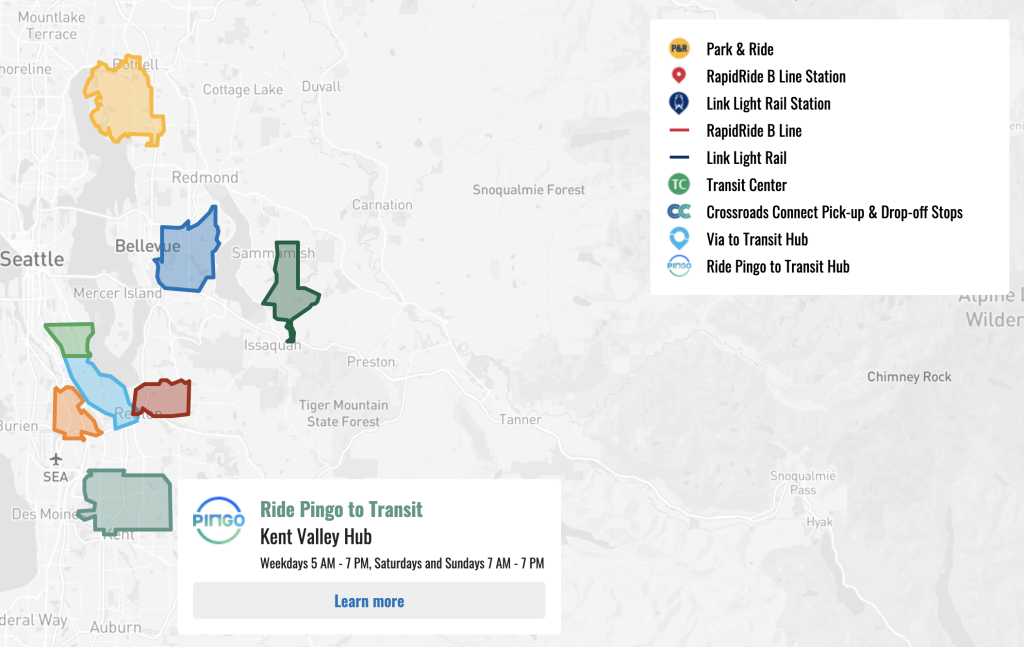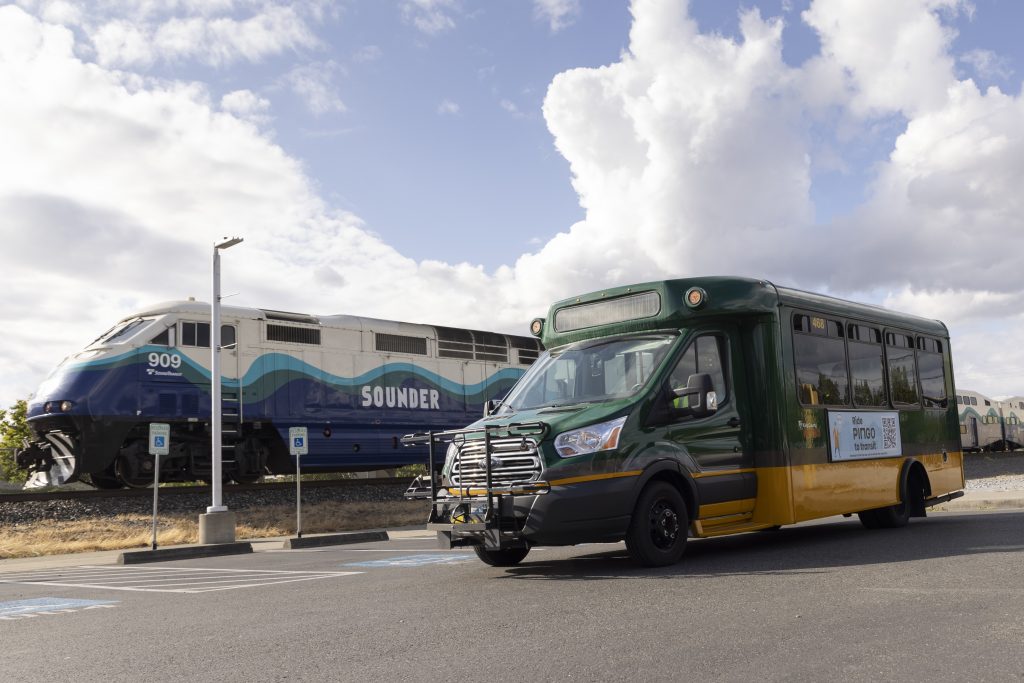A new on-demand microtransit service launched in the Kent area today. Known as Pingo, King County Metro is piloting the service throughout much of the Kent Valley, East Hill, and Panther Lake areas. The service runs similarly to Seattle’s Via to Transit, which recently was expanded — including to neighboring Renton to the north — and to Crossroads Connect, which serves Metro RapidRide B Line and the Eastgate Park and Ride in Bellevue.
These kinds of on-demand mobility options connecting users to established transit have increasingly become popular with Puget Sound transit agencies. Pierce Transit restored and expanded its Runner version earlier this month and has a vision for expansion. Kitsap Transit launched its own microtransit service with Pingo on Bainbridge Island in July. And Community Transit is developing two pilot microtransit service areas set to start in 2022.
However, a recent University of Washington report raised many issues with Metro’s Via to Transit program that raise questions about microtransit’s achievements. The report found that Via to Transit only provided a first-/last-mile solution for about 5% of light rail riders, nearly a quarter of whom had previously used buses to connect to light rail. Additionally, despite features intended to increase access to people underserved by transit, ridership in low-income communities did not increase appreciably. Via to Transit also had a disproportionate representation of White riders when compared to the census demographics of the service area.
Nevertheless, local transit agencies remain enthusiastic about on-demand microtransit expansion, and Pingo will operate within a large service area of Kent. The service area will span throughout the valley as west as the Green River, north to S 188th Street, east to 132nd Avenue SE, and south to S/SE 240th Street. It also includes a portion of Downtown Kent to pick up Kent Station and the James Street Park-and-Ride. Riders using the service will be able to travel anywhere in the service area, but trips must start or end at one of two hubs, which include Kent Station and the Kent Valley Hub at S 212th Street and 64th Avenue S — which is located near the large Amazon fulfillment center, which employs approximately 3,000 workers, 600 to 800 per shift.
How to use Pingo
Riders can request trips via the Ride Pingo app or calling 1.855.233.6043. Service operates Monday through Friday from 5:00am to 7:00pm and on weekends from 7:00am to 7:00pm. The usual timeframe for pick-up is five minutes to a half hour from request and the app provides a wait time estimate. However, there’s no way to schedule a pick-up ahead of time like ridehailing apps. Beyond English, the app is available in multiple languages, including Arabic, Chinese, Punjabi, Somali, Spanish, Swahili, Tagalog, and Vietnamese to serve the linguistically diverse local population.
Fares for Pingo are the same as Metro’s regular bus fares. A single trip costs $2.75 for adults, $1.50 for youth and ORCA LIFT passholders, and $1.00 for Regional Reduced Fare Permit passholders. Children aged five and under can ride for free. Payment can be made using an ORCA card, the Transit GO ticketing app, cash, or a Metro paper transfer ticket.
Pingo will use small transit vans capable of carrying up to 14 passengers. Each van will be equipped with wheelchair accessible ramps and can seat two wheelchair riders. Vans will also have a bike rack with two bike slots. Riders can bring luggage onboard the vans, but Metro urges riders to limit themselves to just one piece of luggage each.
At Kent Station, Metro and Sound Transit offer a significant number of transit connection options, including commuter rail, regional express bus, and local bus services. The valley and hills in the surrounding area, however, are comparably limited in terms of bus service beyond the frequent workhorse Routes 150 and 160, although Routes 161, 165, 168, and 916 do provide a decent overlay and connections. Last year, an overhaul of the local bus network was implemented ahead of future upgrades to the Route 160 corridor as the RapidRide I Line, which will offer speedier and more frequent service.
Kent’s mayor touts benefits for BIPOC and immigrant riders, but measuring the pilot’s outcomes remains critical
The concept for a microtransit program in Kent came about from the Renton Kent Auburn Area Mobility Project, which also led to the area’s bus route restructure. According to Metro, the program was “designed to provide greater mobility options to Black, Indigenous, and People of Color (BIPOC) and underserved communities in south King County.” In fact, Metro reports that the service area has a high number of people who identify as BIPOC and who were born aboard or speak another language at home.
“Ride Pingo to Transit will serve communities where 57% of residents are Black, Indigenous, and other people of color, 34% were born abroad, and 43% speak a language other than English at home,” Metro said in a statement. Many community members have unique mobility needs based upon Metro’s outreach, which “indicated that access to swing and nightshift work at distribution centers in the Kent Valley was a primary entry-point into the workforce for immigrant and refugee populations in the Kent East Hill neighborhoods.”
The service is funded through the end of 2022 in partnership with the United States Department of Energy, The Routing Company, Amazon, and of course Metro. A federal grant is providing $350,000 to cover operations expenses as well as other program costs. Hopelink, which operates other smaller services for Metro, is also the contractor operating the Pingo service while Pingo provides the digital technology and algorithm that the service uses. In terms of wages and benefits, Metro told The Urbanist that “all of the drivers are receiving benefit options that meet Metro’s living wage guidelines.”
In a statement, Kent Mayor Dana Ralph praised the new service option. “Connecting our community with a diverse set of transit options continues to be a priority of ours at the City of Kent. Ride Pingo to Transit will provide much needed access to public transit for Kent residents that is affordable and flexible,” she said. “This service will empower our residents to better access our transit hubs and work in the Kent Valley and beyond. I’m very excited about the launch of this new service and am looking forward to trying it out myself!”
Perhaps in an area like Kent where fixed-route transit service is less abundant, many would-be and existing transit riders will take the leap like Mayor Ralph suggests and give Pingo a try. As the pilot moves forward though, measuring its success compared to fixed-route transit service and other modes will also be important in determining how to make improvements and determine whether it’s an investment worth keeping.
Stephen is a professional urban planner in Puget Sound with a passion for sustainable, livable, and diverse cities. He is especially interested in how policies, regulations, and programs can promote positive outcomes for communities. With stints in great cities like Bellingham and Cork, Stephen currently lives in Seattle. He primarily covers land use and transportation issues and has been with The Urbanist since 2014.






